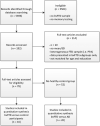Meta-analytic Review of Memory Impairment in Behavioral Variant Frontotemporal Dementia
- PMID: 29552997
- PMCID: PMC7282860
- DOI: 10.1017/S1355617718000115
Meta-analytic Review of Memory Impairment in Behavioral Variant Frontotemporal Dementia
Abstract
Objectives: A meta-analysis of the extent, nature and pattern of memory performance in behavioral variant frontotemporal dementia (bvFTD). Multiple observational studies have challenged the relative sparing of memory in bvFTD as stated in the current diagnostic criteria.
Methods: We performed a meta-analytic review covering the period 1967 to February 2017 of case-control studies on episodic memory in bvFTD versus control participants (16 studies, 383 patients, 603 control participants), and patients with bvFTD versus those with Alzheimer's disease (AD) (20 studies, 452 bvFTD, 874 AD). Differences between both verbal and non-verbal working memory, episodic memory learning and recall, and recognition memory were examined. Data were extracted from the papers and combined into a common metric measure of effect, Hedges' d.
Results: Patients with bvFTD show large deficits in memory performance compared to controls (Hedges' d -1.10; 95% confidence interval [CI] [-1.23, -0.95]), but perform significantly better than patients with AD (Hedges' d 0.85; 95% CI [0.69, 1.03]). Learning and recall tests differentiate best between patients with bvFTD and AD (p<.01). There is 37-62% overlap in test scores between the two groups.
Conclusions: This study points to memory disorders in patients with bvFTD, with performance at an intermediate level between controls and patients with AD. This indicates that, instead of being an exclusion criterion for bvFTD diagnosis, memory deficits should be regarded as a potential integral part of the clinical spectrum. (JINS, 2018, 24, 593-605).
Keywords: Alzheimer’s disease; Episodic memory; Learning; Recall; bvFTD; Meta-analysis.
Figures



References
-
- Balconi M., Cotelli M., Brambilla M., Manenti R., Cosseddu M., Premi E., & . . . Borroni B. (2015). Understanding emotions in frontotemporal dementia: The explicit and implicit emotional cue mismatch. Journal of Alzheimer’s disease, 46, 211–225. - PubMed
-
- Barnes J., Whitwell J.L., Frost C., Josephs K.A., Rossor M., & Fox N.C. (2006). Measurements of the amygdala and hippocampus in pathologically confirmed Alzheimer disease and frontotemporal lobar degeneration. Archives of Neurology, 63, 1434–1439. - PubMed
-
- Ber I., Camuzat A., Hannequin D., Pasquier F., Guedj E., & Rovelet-Lecrux A., . . . and the French research network on FTD-FTD-MND. (2008). Phenotype variability in progranulin mutation carriers: A clinical, neuropsychological, imaging and genetic study. Brain, 131, 732–746. - PubMed
-
- Bertoux M., de Souza L.C., Corlier F., Lamari F., Bottlaender M., Dubois B., && Sarazin M. (2014). Two distinct amnesic profiles in behavioral variant frontotemporal dementia. Society of Biological Psychiatry, 7, 582–588. - PubMed
Publication types
MeSH terms
LinkOut - more resources
Full Text Sources
Other Literature Sources
Medical

